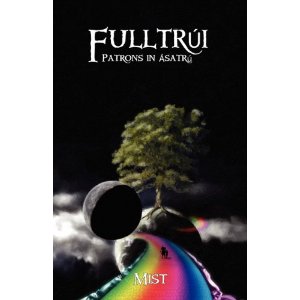
Asatrú is a unique branch of heathen neo-paganism dedicated to the Norse gods. The author, Mist, discusses an apparently controversial practice called Fulltrúi, personal dedication to the worship of a deity from the Norse pantheon. With long-term worship and dedication, the deity may become a personal patron who offers benefits and life lessons.
The characteristics and traits of some (but not nearly all) potential patrons are given, including deities from the Aesir, the Vanir, and some other entities. Methods for guided visualizations through the Nine Worlds (the Norse cosmological construct) are given, along with personal stories about Fulltrúi relationships and devotional poetry contributed by Mist’s kindred (aka, coven members). The author shares advice from her travel experiences of the Nine Worlds, including acceptable behavior for visitors, things to look for, and things to avoid. This is valuable stuff for people who haven’t performed explorations of other dimensions.
The book is written in first person, making it feel more personal and sincere. The book has some problems, though. The author repeats several times that fulltrúi is not well accepted in Asatrú or Heathenry, so it is a controversial choice, especially fulltrúi with a Jötun (or giant), the legendary adversaries of the gods. Apparently only some giants were adversaries, while others were relatives of the Aesir and Vanir. The author is skeptical about the adversarial reputation of the Jötuns and suggests that they were an earlier, more primitive pantheon associated with primal natural forces that was downgraded over time. Mist gets full marks for making this distinction.
Many other branches of paganism and particularly hard polytheists (i.e., those dedicated to a single pantheon) offer the choice to practice dedication to a single god or goddess. The repeated protestations against the proscriptions against fulltrúi in Asatrú felt defensive rather than explanatory. In addition, repetitive sentence structure is an editorial problem that should have been addressed as it detracts from the content. Vigilant editing could have shifted this from a book with mixed virtues to a very good book. Excuses about “preserving the writer’s voice” are pretty lame when far too many sentences start with “I think.” Knock, knock, Megalithica – anybody home?
In spite of the literary problems, this is a welcome guide book to the practice of fulltrúi. Since this topic has not been much covered and is apparently a hot potato in Heathenry, this book is recommended for those who wish to explore the practice of devotion to a sole deity, as well as to those who wish to understand the basis of the controversy. Regardless of the specific flavor, neo-pagans shouldn’t be sheeple! The advice and tips are very good, the devotional poems are beautiful, and the visualizations are effective guides to meditational travel.
~review by Elizabeth Hazel
Author: Mist
Megalithica Books/Immanion Press, 2011
pp. 173, $19.99
